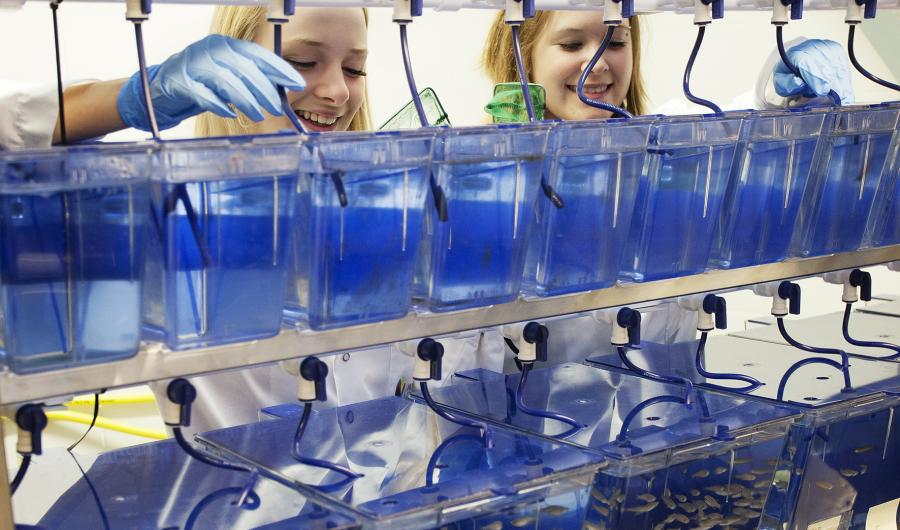
Nordic Master in Sustainable Production and Utilisation of Marine Bioresources
Get your master's across borders and discipline and become part of the next generation of professionals in blue growth and circular economy!
Programme description
MAR-BIO is a research-based Master's programme combining competence from different Nordic countries to educate next-generation professionals within the area of blue growth and marine circular economy.
Through an interdisciplinary approach, the students gain insight into the interaction between Fisheries, Aquaculture, Environment, Law, Management, Production and Utilisation of Marine Bio-resources. The programme builds on expertise in these areas of the Nordic countries
Career opportunities
The mandatory course will prepare the students to a wide range of employment opportunities, as a PhD student or in industry, in the field of circular bioeconomy and blue growth.
Depending on the master's thesis profile, candidates will be well qualified for positions in relevant business sectors such as Aquaculture, Fisheries, further development and production of marine food, utilization of waste bi-products, Biological Consultancy, Municipal Planning, municipal and state management of environment, nature and aquaculture resources, as well as the development of coastal communities.
Admission requirements are:
• Bachelor's degree (180 ECTS) within bioscience or social science, including socio economy
• Average grade of C or better (laudabilis) in the Bachelor’s degree.
• A motivation letter must be uploaded to the application portal within the specified deadline.
For applicants outside the Nordic countries, applicants are asked to document proficiency in English language.
For more information please see:
https://www.nord.no/en/studies/admission
https://www.nord.no/en/studies/admission/how-to-apply-master
Applicants are ranked by:
1. Motivational letter
2. Grades of the Bachelor’s degree
Applicants will be ranked by their motivation letters. The applicant’s motivation for the study, and his/her motivation for the idea of travelling between the partner universities, as well as his/her academic background and future career plans will be emphasized.
Applicants apply to the preferred university. It’s possible to apply to more than one.
The students enrolled in the programme will do a minimum of 30 credit exchange to one of the partner universities; University of Gothenburg or Holar University College. The application deadline for exchange is 1 September for the spring semester and 20 January for the autumn semester. For more information on the process, please contact Jose de Pool, advisor for study exchange.
Knowledge:
Upon completion of the course the students will have advanced knowledge and broader perspective of the sustainable production and use of marine bioresources, including
- aquaculture from a Nordic perspective.
- understanding of Food webs in the ocean,
- aquaculture and fishery industry globally.
Skills:
At the end of the MAR-BIO programme, the student is able to
- independently select and use relevant methods for research and development work
- carry out an independent and limited research or development project under supervision and in compliance with applicable research ethics standards
- present the knowledge acquired and his/her own analyses and syntheses, both orally and in writing.
General competence:
After completion of the MAR-BIO programme the candidate can:
- analyse and deal critically with various sources of information and use them to structure and formulate scientific arguments
- evaluate facts from different sources, discuss them and take a stand for the pros and cons with different theories within the field of marine bioresources
- communicate academic issues, analyses and conclusions both with specialists and the general public
Housing
StudentiNord is Nord University's student welfare organisation, and offers, amongst others, housing for our students in safe and secure conditions. Tenants at Studentinord enjoy affordable rent, no deposit, and janitors and housing consultants available for their service at any time. Living at a student home is probably the easiest way to get to know fellow students.
Living expenses
The estimated living cost for a student is stipulated to NOK 137 907,- per year (2023-24). In addition you may have costs related to insurance, travel, visa fees and eventual tuition fees.
Student welfare
StudentiNord offers a broad range of student welfare services, whether you are in need of medical service or someone to talk to, or maybe you want to engage in a student association or need to borrow sports equipment. Read more about their services:
Facilities at FBA
Noatun is our brand new faculty building in Bodø, finished in 2024. As a student, you can enjoy high-quality teaching facilities and advanced laboratories,framing a vibrant and future-oriented sciencific environment.
PIA, FF Prinsesse Ingrid Alexandra, is our top modern research vessel, owned by Nord University and Institute of Marine Research. At Nord, the vessel is used for educational and scientific excursions at sea.
If you do not have a permanent residency in Norway, but wish to stay in Norway to work after graduation, you can apply to UDI for a residence permit for work purposes. You should apply before your study permit expires.
Job seekers - UDI
Skilled workers - UDI
Semester fees and cost of course literature and laptop apply. In addition to the semester fee and syllabus literature, students are expected to have a laptop with microphone and camera. Students must purchase their own laboratory coat for use in courses with laboratory exercises.
Costs related to visits to partner universities must be expected.
In addition, the compulsory exchange (at least 30 credits) at one of the partner universities, will results in travel, housing and food expenses. The students can apply for a travel grant from the Norwegian State Educational Loan Fund (Lånekassen) if Norwegian. All students can also apply for a ERASMUS+ grant.
Tuition fees
Students with citizenship from countries outside the EU/EEA and Switzerland, must pay tuition fees. This study programme lists as a category D, and the fee rate is NOK 180 000 per year.
Nord University does not offer scholarships or grants. You can find more information on tuition fees, payment details and exemptions on our website.




